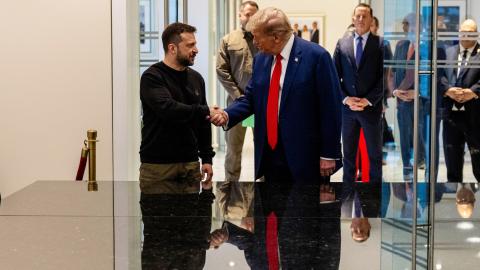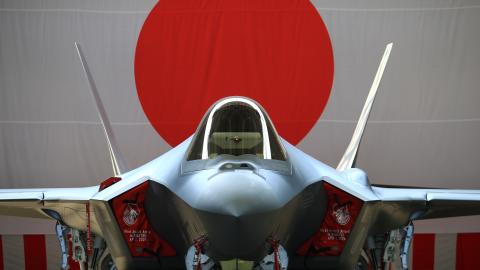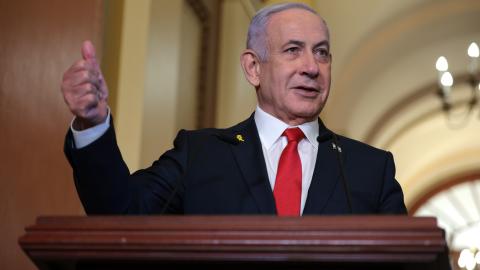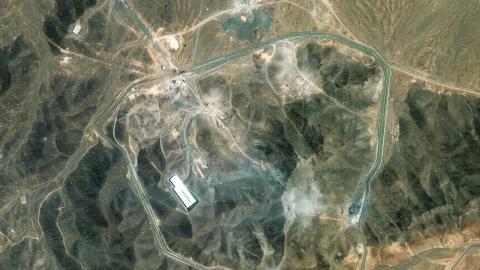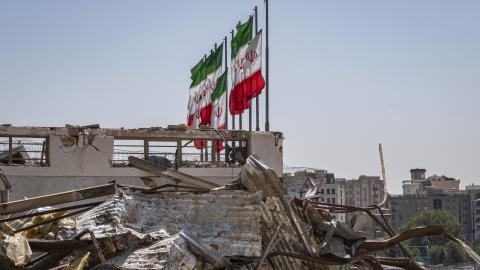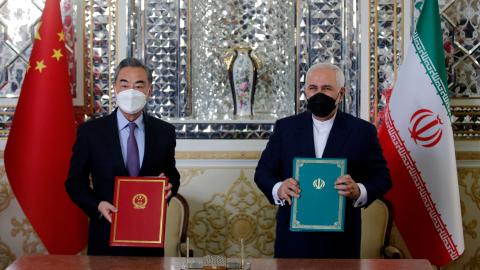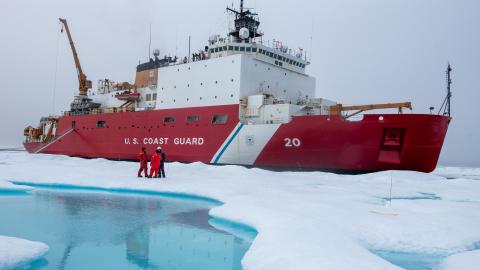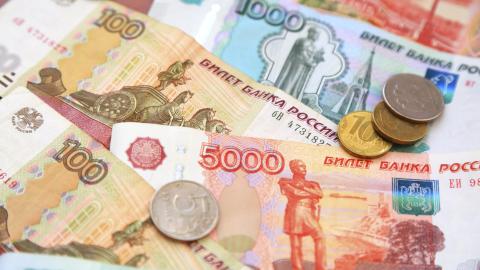
The Han Kuang Exercise and the Taiwanese Military’s Road to Readiness
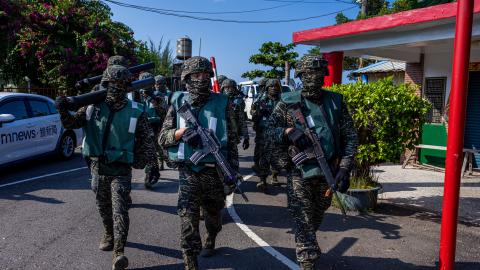

USN (Ret.), Senior Director, CCTI and Senior Fellow, Foundation for Defense of Democracies

Senior Research Fellow, Heritage Foundation

Senior Fellow and Director, Center for Defense Concepts and Technology
Bryan Clark is a senior fellow at Hudson Institute. He is an expert in naval operations, electronic warfare, autonomous systems, military competitions, and wargaming.

Senior Fellow
Riley Walters is a senior fellow at Hudson Institute specializing in international economics and national security.
July 9 marks the start of Han Kuang, Taiwan’s largest annual military exercise. This year’s will be the longest ever, with 10 days of live-fire drills. Notably, it will also incorporate more civilian defense exercises and gray-zone scenarios, demonstrating Taiwan’s focus on whole-of-society readiness in the face of China’s increasing belligerence toward the island and across the Indo-Pacific region.
President William Lai has already committed to increasing Taiwan’s defense budget to over 3 percent of the country’s gross domestic product to prepare for and deter China’s threats. Han Kuang is a chance for the country to demonstrate its improved military and societal readiness.
Hudson’s Riley Walters will discuss what to look for during these exercises and what more Taiwan can do to strengthen its defense posture with a panel of military experts.
Key Points
The drills were more realistic this year and, importantly, included more reservists. Taiwanese military planners incorporated more reserve forces in this year’s exercise. This is a step in the right direction, as Taiwan’s reservists will be crucial in repelling an invasion. Additionally, whereas many large-scale exercises suffer from being overly rigorous “puppet shows,” Taiwan left these latest drills largely unscripted.
The drills suffered from a lack of US participation. Whether it’s necessary for Han Kuang or not, Taiwan’s future exercises need to take the next step: conducting joint training between US and Taiwanese forces. Increased US presence in Taiwanese exercises (or vice versa) would boost cohesion and push the two militaries closer. This could take the shape of joint missions, increased sea patrols, or enhanced work systems.
Taiwan needs to prepare for cyber warfare alongside a conventional invasion. Another way Taiwan could make its exercises more effective is by incorporating more cyber warfare elements. It is almost certain that China will use its cyber capabilities to cripple the island before launching a cross-strait attack.
Taiwan needs to prepare for a blockade. In a blockade scenario, Taiwan will need help from the US and partners like Japan, the Philippines, and Australia. But Taiwan also needs to focus on increasing its long-term preparedness and improving its societal resilience.
The US needs to get serious about an invasion in the Pacific.
America needs to fix its inefficient defense industrial base and complete its own military modernization. This means fielding uncrewed systems at scale and increasing production of long-range fires.
Event Transcript
This transcription is automatically generated and edited lightly for accuracy. Please excuse any errors.
Riley Walters:
Welcome to Hudson Institute. My name is Riley Walters. I’m a senior fellow here. And if you’re joining us either in person or online, this is our event, the Han Kuang Exercises and the Taiwanese Military’s Road to Readiness. Very exciting week.
This is the 41st Han Kuang Exercises. The live fire element of the Han Kuang is happening this week. It is the longest, I believe, in history of 10 days, of live fire drills, and probably one of the largest as the Taiwanese military incorporates 22,000 reservists into this exercise.
So if you’re unfamiliar, these are annual events. These are not something that’s just willy-nilly that’s happening out of the blue. This is the 41st of these. So it’s been happening for four decades to simulate a Chinese aggression against the island Taiwan.
And the theme of this year is a 2027 scenario where a gray zone activity elevates into a military conflict. And why is that important? Well, for several reasons. Taiwan, Philippines, Japan, many of these countries today are currently facing the threat of Chinese non-military action against their territories, whether it’s through their Coast Guard or maritime militia, things of these sorts. Many of them are dealing with Chinese provocation.
And 2027 is also, of course, a big year if you’re familiar with the Davidson Window, I won’t go into that. But the exercises this year, again, are very large. And so we’re going to talk about why they’re significant, whether the exercises themselves are showing the Taiwanese military readiness going in a good direction, a bad direction, or just par of course.
And so we’ve invited a number of experts here today to talk about these exercises, Taiwanese military, and perhaps we’ll talk a little bit about the US military readiness and all this as well. And so I’m going to give quick introductions of my speakers.
They’re going to speak for five to 10 minutes. Then we’re going to go into questions and answers with you, the audience. So first up, the far left here we have Mark Montgomery. He’s the senior director for the Center on Cyber and Technology Innovation, and senior fellow at the Foundation for Defense of Democracies. Within his expertise includes China cyber warfare, the Indo-Pacific, and US Defense Policy and Strategy.
To my immediate left here, we have Brent Sadler, who is a senior research fellow at the Heritage Foundation. He focuses on maritime security and the technologies shaping America’s future maritime forces, especially within the Navy.
And finally, on the screen here we have Brian Clark, who is a senior fellow and director for Center for Defense Concepts and Technology here at Hudson Institute. He is an expert in naval operations, electronic warfare, autonomous systems, military competitions, and war gaming.
So I encourage you to be active listeners, prepare your questions for when we go into the questions and audience. I don’t mind fielding all the questions myself, but of course, I think you all here are here to actually participate as well. So first up, I’m going to ask Mark, the floor is yours.
Mark Montgomery:
Thanks, good to be here. Appreciate the invitation to Hudson and good to see you all on a Friday afternoon. So I think I’ll describe what I think Han Kuang is and what it isn’t. What it is is, it is an exercise for Taiwan to work its most dangerous scenario, that is the cross-strait invasion.
So you see a lot of the, there’ll be efforts to prevent an allotment. That means shooting ships and helicopters down before they can come across. There’ll be an effort to defeat a lodged force that has air power support and things like that. And then there’ll be an assessment of how well they can hold on until US air power rolls back China and gets us back involved four to seven to 10 to 14 days later.
I think it’s important because it does drive their military requirements. And when they do it right, it drives their military requirements for what you need just prior to war, which tends to involve their air force and their Navy because sometimes we try to say, oh, they’re a porcupine. They’ll just do counter-intervention forces.
Well, that’s not how national security and military policy works. You don’t just hunker down while an adversary achieves or complete air dominance and maritime dominance over you before war starts. Well, if you’re Iran, you might do that, but for the rest of us, we try our hardest not to get in that position. So you need to have air power. You need to have sea power.
But then most importantly, what are the ground forces they need? And I consider the Han Kuang, this series of exercises, the method through which we pulled them when we left them high and dry in 1979, we dropped off what’s called Field Manual, FM1 which was a description of how to defend the Fulda gap. And the Taiwan’s worked really hard on that problem for about 30 years.
The problem is that’s not what they’re facing right now, and they need to get a different kind of ground forces going. So hopefully, this will help them understand how to better use the reserves and we can talk a little bit about that and the questions, I hope, and then what requirements they need, what kind of command and control and integration.
So that’s what it is. It’s a fantastic thing. In the remaining two minutes, I’ll try to describe what it isn’t. It isn’t a bilateral exercise. We have observers there, but it isn’t a bilateral exercise. As a result, it’s not developing the bilateral skills that are absolutely necessary.
So this is a big shortcoming in this exercise. It’s caused by the United States being weak. We’ve always been able to do exercise with them. It fell under the Taiwan Relations Act. Congress begged the Department of Defense for the last two decades to get their act together and do exercises with Taiwan, but it was always a sense of Congress.
Then with the Taiwan Enhanced Resilience Act three years ago, we ordered them. Myself and a few other people who had been working the begging for long enough finally got the opportunity for a law that was passing. And we put in the you shall, and we’re doing a half-assed job of it.
Right now we’re doing more exercises, but for the Navy, there are a couple steps above flag bag, which is a Navy term for a low-level exercise. We’re not doing the real detail. Han Kuang would be a great opportunity to begin to develop those skills because right now in the Taiwan, if we went to war, the Taiwanese and American forces would be de-conflicted at best instead of the next level of coordinated or integrated or unified.
When two militaries both are de-conflicted, it’s like two plus two equals three. We need to get to two plus two equals four, two plus two equals five. That means you need to get coordinated or integrated. You only do that through having this similar equipment, which they do have, but also similar processes and exercising and training together, which we don’t have. So it’s really missing that.
If I say one other thing, I know I’m going a little long, it’s also missing the most likely scenario. So I said at the beginning it was the most dangerous scenario, but the most likely scenario is that China’s going to run a cyber-enabled economic warfare campaign against Taiwan with little touches of military interference like missile closure areas and seizing of ships and things like that, and get at the financial energy and communications vulnerabilities of Taiwan.
That’s the exercise they got to be working with. President Lai knows this. He’s championed something called the task force in Societal Resilience. But I think it would behoove them to begin to pull that into the exercise. So keep the most dangerous scenario is the end game, but start with the most likely scenario, bring in your partner in the United States bilaterally and then execute this last part.
So they’re doing the third part of what I would say is a three-part exercise, and they’re going to do it well, I think. Well, no matter what, we’re all going to say there’s a great exercise that you have to, but the reality is, it’s missing those other two big elements.
Riley Walters:
Well, recommendations for next year’s theme. Thank you. Thank you for those remarks. Brent, I’m going to hand it over to you.
Brent Sadler:
Great. First off, it’s great to be amongst old shipmates. Of course, Riley and I worked together for a little bit at Heritage before he came to Hudson. The Admiral and I worked together at Indo Paycom. Well, then, it was Paycom. And Brian and I were on the CNO’s personal stuff years ago.
So I know a little bit about where everyone’s coming from. So I’ll focus in perhaps a spot that maybe Brian won’t head on and definitely not retread the topic, the commentary that the Admiral’s talked about already. So context matters. And so Han Kuang is occurring as PLA is doing at the height of their summer exercise season.
So if you’re following the day-to-day ministry of defense reports, there’s been some fairly significant air and naval presence been ongoing with a lot of media line crossings. This, once upon a time, used to be rare, but in the last three years, this has become common occurrence.
So there’s been a desensitization to that. But we should be very sensitive to the fact that you have a lot of military activity on the island and around the island that’s Taiwanese. And then you have a lot of military activity that’s going on around it at the same time from the mainland to include amphibious assault exercises just across the strait and mainland China.
So interesting times to say the least. And the other one on, again, going back to the origin of Han Kuang, it’s also partially a message to the people for internal domestic purposes, but it’s also morphed in to take on a regional messaging as well.
And an important one also here to Americans, that Taiwan people are willing to stand up and defend themselves if they’re attacked by mainland China. This is a case and that message can be made, and it’s an important one for folks up on Capitol Hill, but also folks in the administration to hear and see that. The point of that being you’ve also got public media that’s also now in the international things like Zero Day attack.
So last year’s Han Kuang, you had this TV series that was being advertised about a mainland invasion. Well, the series is supposed to come out next month, and it’s being promoted again right as we’re going into these exercises. So, interesting.
Riley and I were talking about this over lunch. I’ll be very interested to see the stories and the first episodes, and I would probably not be surprised if there’s a season two next summer that also comes out at this, again, for the public consumption in Taiwan.
But I think also increasingly, to send a signal that Taiwan will defend itself. It has the capability to defend itself. It can’t do it by itself over a long haul. And that’s really a very interesting question about sustainment. And for a long war with mainland China, which would, my assumption is the United States is going to be drawn into it no matter what if for no other reason, there’s a huge amount of Americans that live in Taiwan and would be victims.
So that’s the geo strategic context that’s going on. I think it’s going to get more interesting in the next couple of weeks. So I watch this very closely this time of year every year. The other thing that I think is important is what we saw two years ago. So the gray zone theme that’s going on, it really got a few people’s attention, yours, my attention included, when Fujian Province announced that they were going to start inspecting ships crossing the strait.
They didn’t do it. They just announced they were going to do it. And of course, that was to be a heads to Beijing. Then last summer, you actually saw impoundments and inspection of vessels around Kinmen Island. This year, it’d be interesting to see if the pressure’s turned up at the same time that Han Kuang’s going on to try to prevent or at least counter such gray zone activities.
But my final comment, looking at the clock, gray zone is fuzzy. A blockade could be a form of gray zone, and I think gray zone, if you include that in that definition, has a very high propensity of becoming conventional warfare. And so you have to be prepared for that spectrum of conflict or rivalry.
And so merging the economic, the military, and the diplomatic from peacetime, to gray, zone to full outright warfare is I think, necessary and a critical one and something to watch as Han Kuang adapts and changes over time as well. And look forward to the questions.
Riley Walters:
Excellent.
Brent Sadler:
I think I threw a lot of Easter egg or eggs.
Riley Walters:
Lot for people to question, pick up on. All right. Last, Brian, I’m going to pass it over to you.
Bryan Clark:
Thanks, Riley. And it’s great to be here with Brent and with Mark, both of whom I served with in the Navy. And I went to war college with Brent where I’d basically watch him get all the writing awards because he was a superstar there. So it’s great to be there with both of them virtually.
So to build on their remarks, which I agree with, I would assign myself to those remarks. I agree with Mark that the exercise really tries to look at the Taiwan unique aspects of defense of the island and really needs to make sure that they do more of that.
Because in the pre-conflict period, as Mark said, there could be a lot of ramping up and ramping down of blockade and quarantine activity that Taiwan needs to have a military to address. And turning itself into a porcupine does not help it protect itself from those kinds of gray zone or operations short of war that China does impose on them regularly.
So I think we need to remember that Taiwan’s military has to be a multi-mission military just like anybody else’s for that purpose. But then the exercise has to also account for the things that are combined operations that needs to do with the US to protect the island in the case of an invasion.
And that’s where things like Abra, so a lot of uncrewed systems, they might be coming from the United States. They have to work together with those systems. They also have to now work together with long-range fires that are coming from US bombers or submarines to take out amphibious ships.
So that coordination is going to be absolutely necessary to ensure one fratricide doesn’t happen, but also just to make sure that the operation achieves the goal, which is to degrade the invasion enough that it doesn’t get a lodgement ashore. And if you don’t practice that, it’s going to be very difficult to do it in wartime.
And a lot of analysis shows that if you can coordinate that correctly, the long-range fires and the Hellscape work, that is enough to keep China from succeeding that first invasion attempt. But if it’s a mess because it’s not well-coordinated, then China might just be able to get enough troops ashore to succeed.
The other thing to bring out is the need to think about the blockade scenarios, as Brent was saying, is how do we work together on that? We’ve done some recent war gaming. I’m going to do war game next week that looks at it. And it is extremely challenging even if the US helps.
It’s not easy to come up with a way that you restore access to and from Taiwan in the event of a Chinese quarantine or like Brent’s saying, this sort of inspection regime that could become very degrading to their economic livelihood.
There’s not really an easy way out of that. So coming up with schemes that help address that is maybe the most important thing that we could be doing right now. And we’re not seeing enough maybe effort along those lines. And it’s not as sexy as preparing for an invasion, but it’s probably more important for Taiwan’s long-term independence and resilience.
And I guess to my last point is resilience. When you look at how countries dealt with the Cold War challenge of the Soviet Union next door, like Finland, their emphasis was, one, on making itself a porcupine. So using mining, using ground forces along the border to try to slow down a Soviet advance.
But they were realistic and knew that if the Soviets wanted to take Finland, they could. And then the focus was on resilience. How do you keep your society resilient in the face of potential occupation?
Maybe Taiwan needs to think about that whole effort at resilience from pre-conflict through conflict, through even a partly resolved conflict. And I’m not seeing, obviously, the president lies has made that a priority, but putting more effort into thinking about how do we do this continuum of resilience is maybe just as important as dealing with the blockade.
And I would argue that the counter-invasion activity, there’s probably a scheme that addresses that we’re pretty close to cementing and that we need to turn our effort to these other priorities or else we risk missing the forest for the trees and Taiwan ends up capitulating for reasons other than an invasion being successful.
So with that, I’ll turn it back over to you, Riley. I’m looking forward to the discussion.
Riley Walters:
Great, thank you.
Mark Montgomery:
Hey, Riley, can I bring up one thing?
Riley Walters:
Yeah, go ahead.
Mark Montgomery:
I agree with everything Brian said there, but I want to pick up on the idea of how our Navy, maybe the Japanese Navy get involved in this and that’s, I think, through convoy operations. And I think the hard part about this is the easiest time to do a convoy operation is early before when it’s going up against a less aggressive force or less the dominant position by the adversary.
If you wait until an island is fully blockaded and say, now I’m going to do this, you become the tool of escalation. In other words, you’re going to have to force your way in kinetically. Whereas if you start your convoy operations at the lowest possible level because you’ve been practicing it and doing it and rehearsing it, and you have allies and partners like Japan and Australia that participate and it becomes a thing, an in-situ skill that already exists there, then you can do it in a way that forces the escalation management onto China.
In other words, let’s say they do a missile closure area, we immediately begin to escort in with Navy ships. We’re saying, we know you’re not willing to fire a missile into a US Navy ship. You are not going to prompt, jump, escalate this into World War III over a missile closure area, a putative missile closure area.
But this takes nimble, agile national security decision making, which is not something that I would describe US national security decision making over the last 30, 40 years. In general, this is why democracies fail in gray zone is because we are not agile, we’re not nimble, we don’t move. And the only thing slower than one democracy in the gray zone is two democracies trying to work together in a gray zone.
But the way you get around that is repetitive practice routine, establishing existing mechanisms like coalition, maritime forces, things like that. This is how we have to start thinking and it’s going to take a level of forward-thinking on Taiwan that we have, thanks to Henry Kissinger, inert ourselves against that we don’t want to be the leaning in force, and I think it’s going to have to be the United States. I don’t think Taiwan can do this.
Brent Sadler:
Just to add up.
Riley Walters:
Go ahead.
Brent Sadler:
So I would say rather than episodic exercise as a persistent presence of sea lane protection, patrols not in the Straits, but on the Philippine Sea side. And we’re seeing reasons for this even in the Black Sea for the mines.
And so if there had been a NATO presence built up over time, at least patrolling the NATO vaccinations might’ve been the mine problem would’ve probably been a lot easier to address up front, might’ve even had somewhat of a deterrent effect.
But we’re in clean up mode a little bit there, certainly not aggressive on offense. And so now’s the time for the Japanese Maritime self-defense force as the Korean Navy, the US Navy, to at least start patrolling in a near persistent basis for sea lane safety.
You can call it whatever you want, but for all the reasons that the Admiral laid out, you don’t want to do it in the midst of a crisis. You want to have it normalized.
Riley Walters:
Of course. Yeah. I do want ask about US, and I also want to ask about Japan-Korea since it’s been mentioned. But I want to start with Taiwan. Let’s start from the area first. So, Han Kuang, in the past, has been criticized as being a puppet show. It is been very scripted this year. It’s off script. Take that for whatever you will.
And so there are different elements of this. I think right now we’re all focused on the live fire, but there are different elements, virtual aspects, maybe some cyber involved as well. Real quick, if you want, and then we can go into the US side, what should we, as an audience, be expecting or looking for at the end of these ten-day live-fire exercises?
How do we grade this Han Kuang? Maybe you can grade it against pass Han Kuang’s, or you could just grade it against where we think Taiwan should be overall. And that’s open to the group, so whoever wants to jump on that grenade first.
Brent Sadler:
We’ll let Brian go first.
Riley Walters:
Brian, you want to go first?
Bryan Clark:
Sure. Yeah. I think we should be looking to see if there’s really an effort to deal with the ramp-up to conflict. So are they doing a realistic effort to deal with the likely escalation of presence and the escalation of activity pre-invasion or does it look like that’s just we’re doing, we’re going through the motions because we want to get to the big event?
And then when they do practice invasion defense, is this what we see in the past, which is using boats and helicopters and shore-based manned missiles to deal with the threat? Or are we looking at really the introduction of a lot of uncrewed systems like we’ve seen in Ukraine?
Obviously, there’s some uncrewed systems at play right now, but are they being operated at the scale to demonstrate that ability to do command and control of these systems and manage them and think about the operational concepts they would employ to put them into play like what Admiral Paparo was talking about with Hellscape.
So is Taiwan able to do some of that on their own? Those are the things I’m really interested in seeing.
Mark Montgomery:
I ran a lot of exercises at PACOM and UCOM as a general officer, and they’re all scripted. I don’t know what that criticism is scripted. The biggest script is RIMPAC. That’s a lowest common denominator scripted exercise. The best thing I’ve seen in the last two years is Taiwan stopped asking to go.
They don’t need to go. That’s a weak exercise that has almost no value to the participants other than the diplomatic one. And they’re not going to, frankly, whether other countries aren’t going to renounce their recognition of China over the US admitting Taiwan into a exercise, the Way...
Look, these exercises, there’ll be some value in it, but they’re all an F until they do them bilaterally, until they do them across the phases, as I said, starting with the cyber-enabled economic warfare campaign. And that’s going to be hard because that means we have to get involved and we’re going to have to get off the bench and be a participant in this, and China’s going to become unglued for a couple of hours or a week or a month, and that’s that.
But this is where we’re at now. We cannot allow our adversary, and China’s our adversary, to dictate how we work with our partner or our ally, and Taiwan’s our partner ally. It’s inappropriate, the deference we give to China and we got to back off of that and we do it on a bipartisan basis.
And you know what the presidents think when you catch them in off-cuff moments, and we caught President Biden in several off-cuff moments? China’s adversary, Xi is a totalitarian authoritarian leader, and we need to fight to protect Taiwan. We do ourselves no service not being involved in something like this.
How can you tell the American people, we’ve got this plan, we plan on sacrificing between 7,000 and 30,000 Americans to win a war that we are not going to practice for fear of unnerving the adversary? That’s crazy. Why should American people want to defend Taiwan if we’re not willing to go exercise with them?
The answer to this question is go exercise with them, take the heat round from the Chinese, laugh it off and move on. They don’t get to dictate who our partners are and who we play with. There is only one really big country in the world, and it’s not China, it’s the United States, and we need to act like it when we deal with them.
They treat every other country in Asia like this. They walk up to everyone and say, we’re a big country. You’re a small country. Shut the you-know-what up. And they treat Australia like that. They treat Taiwan like that. They treat Japan like that. Screw it. We should treat them like that. Sorry. God, it pisses me off, this deferential-
Riley Walters:
It’s okay.
Mark Montgomery:
But this deferential does us no service. You think, oh, we’ve avoided a diplomatic spat. Yeah, but you’ve made it so we’re less ready to deal with the road. And eventually, China assesses this to, okay, we can move. The United States is weak and vacillating and doesn’t really care about Taiwan.
By the way, if that’s the case, then we should knock it off and just get out of there, let the Taiwan settle it up with the Chinese. But since I don’t think we believe that we should be stepping up and acting.
Riley Walters:
Let me pull on that thread with my next question. I’ll let you take the first answer on this next. It’s very similar.
Brent Sadler:
There’s a few-
Riley Walters:
There’s a lot of themes. So my next question is, yes, from my perspective, there is a lot of inconsistency in US-Taiwan policy. You go on the hill and it is bipartisan support for Taiwan, but if you actually look at the arm sales, the training, the actual things happening, it’s very inconsistent.
So how do we square that circle? How is it that we have such political support within Washington for Taiwan, but we don’t actually see it through the increased training exercises, the increased regularity of arm sales? How do we build, is that a US thing? Help me understand that.
Bryan Clark:
You go first.
Brent Sadler:
Yeah. Well, I know the Admiral’s got a lot of time on the hill in this one too. So I think part of it is a disconnect between a say do. It’s like it’s easy to say it. It’s a little harder to do, and I think that plays out in the politics and each politician’s got their own constituent we have to think about.
So that question is individualistic, and the overall part is there’s not enough political sentiment at the constituent level to really drive this to take the risk. And the risk would be getting into a co-fluffle with the Chinese where they make an economic cause to a state or to a constituency.
I think the reality is we’re far into the affirmative of action and leaning forward. And that’s why the recent legislation in the last couple of years tried to, the Shao language does come to point, but also directing arm sales.
And so I watch the arm sales, the delays in overcoming the delays, the debate about where should the weapons go to, Ukraine versus Taiwan. The reality is it’s a pay me now or pay me later. You have to do both, quite frankly. It’s not a choice. It’s how you actually execute that so that you help on the one front while you deter effectively on the other.
And that requires smart, very well-informed policymaking and the hill in concert with the administration on how Han Kuang can help get to that point because that’s just the US side, I won’t even try to guess in Taipei or the others. But Han Kuang, I judge the success this year.
Will the domestic audience in Taiwan be more supportive of spending more on defense, understanding of the dangers that they’re in and how the military is being postured to better address that or not, and to hold their public leadership accountable for that.
On the outside, I would also judge it. Does it make a splash in the United States to counter this very caustic, unhelpful narrative that the Taiwan people are not willing to defend themselves and that’s why we shouldn’t spend any money, which is not the case. I do not subscribe to that, and I have not seen that from my experiences.
But that goes to the heart of what this exercise was created for was strategic communications of sort. It shouldn’t be only that as the admiral points out, and I agree with all that, but I would just add that that’s one of the things to value.
Now, the third and final point I wanted to make is, the other thing I watch is if the PLA and the military in China, in Taiwan actually come close to each other, I’ll be watching how they actually deal with it. And if there’s an incident or even if there’s an accident, if there’s a military incident just with Taiwan military or just with the PLA, it’d be interesting to watch how they react in Beijing and Taipei to that, but also in Tokyo, Seoul, Manila.
So we’re always moments away from that type of incident when you have militaries operating this close to each other at such a high level of readiness and regional tensions at the same time. So those are the things I’m watching and how I would judge my scorecard at the end.
Riley Walters:
I’ll let you both answer, give your thoughts. Just want to let the audience queue you guys up. If you have any questions, start thinking about them. I’m going to come to you in just a minute. All right. You were itching to say something.
Mark Montgomery:
The question on disconnect, look, our FMS sales don’t suck to Taiwan, they suck to everyone. The harpoon missiles, Taiwan’s been waiting on Saudi Arabia’s like an extra 18 months.
The Javelins and Stingers that Taiwan was waiting on for a long time, the 250 that delivered last year and a half ago, Kosovo ordered them a year later, still hasn’t received them. So we just suck at FMS. This is not a Taiwan issue. We do have to get it fixed.
I will say the most hilarious thing is to hear Bridge Colby say they got to spend 10% on defense or something close to that. That would mean they would have to go from... Right now we deliver 3.5 billion a year, maybe 4.5 billion a year in FMS. Orders are 10 billion one year one the next 10, but we deliver about 4.5 billion on average.
If they had to go to 10% with us being the only country selling to them, they would have to get 35 to 40 billion a year in FMS delivered. Who here thinks that we’re going to make FMS 1,000% more efficient anytime in the next... And they want this in two or three years.
So unless the goal is to have them take the call money, defense money, put it in a barrel and burn it, they’re not going to get there unless we get our act together and get this better. So first, stop blaming them for this problem. This is on us.
Now, I do want to say one other thing you made me think of it on this exercise. They do have to get an idea about the reserves. The idea that they have two million reserves is a joke. Taiwan needs to have... They need to look like Estonia, Israel, Finland, they can pick their choice.
I’d pick Israel, they should have about 200,000 to 300,000 reserves. They’re the bulk of the fighting army. And what they’re going to have to do is really hard because the army, which is still a little bit of a grandee army, has got to give up.
They’re going to have to reduce themselves from like 18 fighting brigades down to about 12, 13 or 14, take those brigades that they stood down and integrate them into the reserves as the trainers and the enablers of the reserves. And then instead of having 16, 17, 18 fighting brigades, active duty brigades, they’ll have 13, 14 of them, but they’ll have 30 reserve brigades.
That’s how you defeat a lodgement by China. That’s how you absorb the blow from China. Have an effective reserves that train every year for two weeks, not every 12 to 14 years for two weeks. And the reserves that come up like the Israelis do through their conscript class and stay together for years or decades and come back on active duty routinely. That’s how you win this fight. That’s a hard societal change.
When we see that start to happen, when we see that kind of lesson learned come out of it, and the effective use of the 22,000 troops you mentioned, I think that’s when we’re going to know, to me, that’s a marker of success. So there’s stuff for us to do the United States and there’s stuff for them to do, but this is all doable.
Nothing I just described there was cold fusion. Everything I described is executable to some of them are hard and some of them are expensive.
Riley Walters:
Brian, I want to give you a chance to comment on this real quick, but I generally see that the debate around Taiwan’s defense in three different camps. You’ve got the old large systems folks who are still very prominent in the Taiwanese military industry who are big weapons systems. We like that.
We have the sort of new emerging asymmetric camp who is much more popular these days, thanks to Ukraine. And then of course, you’ve got the third element, which is the personnel. And I think that tends to go unappreciated. I think there are some in Taiwan who are trying to elevate the personnel side of this, and this exercise begins that conversation.
Will it actually develop into anything? We’ll see. I’m going to give Brian a check and then if you have any extra, but I want to go to the audience as well. Brian, do you have any comments?
Bryan Clark:
Yeah. So to build on what Mark was just talking about, I think that’s part of this idea of societal resilience. And when you talk to Eastern European countries, they see this idea of a large reserve that is well-trained as being a key element of making sure the society is resilient.
And obviously, it also helps your fighting capacity. And I think in Taiwan’s case, it would also be a way of better personnel, or I guess better crewing its maritime arm because it’s going to have to come up with a way to deal with the increasing intensity of these quarantines and blockades and other gray zone activities because the US isn’t going to come in and help with that unless it seems like it’s rising to the level where it might cut Taiwan off.
So, Taiwan has to have the ability to deal with those situations on its own, which means it can’t just devote its entire budget to stopping the invasion on the beach. It has to come up with a way to have the people and the money being allocated to these other counter-intervention activities to keep the Chinese from squeezing it economically through the maritime or even through cyber, as Mark was saying.
Another thing is Mark was talking about this idea of large numbers of US casualties. So we’re talking, we can lose tens of thousands of people in a fight to protect Taiwan from an invasion, yet we don’t exercise with the Taiwanese, which is just insane. But one of the ways we drive down those casualties is by using things like the Hellscape using things like long-range fires from submarines and bombers.
The combination of these things with counter C4 ISR capabilities could make it so our casualties are much more limited. The problem is that will only work if we do it in concert with the Taiwanese.
And if we don’t do it in concert with the Taiwanese because Hellscape has to operate from their territory, then we do get back into the world where we have strike fighters flying over the very contested airspace over Taiwan in an effort to try to stop the invasion. And we lose it up a lot of pilots, we probably lose carriers, we lose destroyers in the process.
So being able to do the fight in a way that manages casualties is going to require us to exercise with the Taiwanese. And that’s a part of that calculus that hasn’t really clicked on the US side because people don’t think in terms of how the fight might actually go, what are better options to execute it?
And I’d say the last thing is on the industrial base or FMS. Part of the problem with FMS is the fact that we just can’t build the weapons fast enough. So we have customers everywhere across the world, and yet we don’t have the industrial base to deliver on those because we’ve had a combination of insufficient orders over time and then insufficient management of the industrial base.
And in a lot of ways, we’re buying the wrong weapons. So we should be thinking about buying weapons that have scalability and more modularity and things like the new ERAM program and MACE programs are evidence or examples of that, but we’re maybe buying the wrong weapons and that’s part of why we’ve got this lack of scale and why countries can’t get the scale of weapons they want through the FMS process. So I’ll stop there and turn it back over.
Riley Walters:
Did you have a quick thing on this?
Brent Sadler:
Yeah. Just a quick thing on this. We live in Taiwan is in this world too, an and world. And what I mean by that is there’s a lot of emphasis on the asymmetric. Critical needed was a gap for far too long to try to impose cost if the Chinese decide. There’s also, as you also talked about, the human element, the people side of it.
And that’s again, Han Kuang’s designed to help on that a little bit. And that’s also where Admiral’s points about the conscript, but also like an Israeli model resonates a lot with me. Getting there is going to be challenging of course, and it is been hard even with their own restructuring over the last 10, 15 years with an NCO Corps and also with recruitment.
But the final one, which always was a point of consternation by a lot of detractors in this town in Taiwan, was the fixation on the glam items. And I am in the school that does, and not at first, but over years, that there is a value in that. And it’s a psychological one more than it is a operational though.
There is an operational utility having F16s and having submarines, though indigenously built submarines. It does show that there is a commitment from the United States to transfer that type of technology. And the history is the first Taiwan crisis, I think it was, where we gave air-to-air missiles to Taiwan.
So that actually had a huge impact on the battlefield. We’re not going to necessarily replicate that with the difference in size, but don’t not consider the psychological impact of those large purchases, but it’s not an or it’s an and.
Mark Montgomery:
Let me pick up.
Riley Walters:
Keep us talking.
Mark Montgomery:
I love that. Let’s pick up in the first Taiwan-States crisis. So grandfather fought it in our, I’ve heard him talk about it, but we had 17,000 troops in Taiwan. We had air force wings flying there until 1975. This was a serious ally that we’ve treated poorly since.
But I do want to pick up on one thing because Brian talked about it, and he’s right that we have to be working together now when I said the coordinated, I mean the deconflicted to coordinated, to integrated, to unified, the key in there somewhere with, I did this with the Japanese when I was a destroyer squadron commander at Admiral Station out there.
We moved from coordinated to integrated, and the key to that was command and control systems, communication systems, cryptographic systems that allowed you to talk and exchange firing quality track data across your ships.
This sounds complicated. You have to do it. If we do not do this with Taiwan, we’ll stay deconflicted, which is, you go left, I’ll go right. I have a son stationed in Japan. I jokingly say that my number one worry is this ship gets sunk by a Chinese weapon. My number two worry is a US army weapon. We’ll set that one aside. But my number three worry is a Taiwan weapon and I say their Navy should worry about us doing the same to them.
We have got to get exercise and constantly be putting the gear on each other’s ships, so they’re at the point where they’re fully integrated with us. So when the balloon goes up, when the fight starts, we’re not like, Hey, we’ve got to get some crypto gear over to the kid class destroyers because we can’t operate with it. It’s too late.
There are already people you don’t want to be anywhere near and we’ve got to get out of that. And it applies to our aircraft as well. It’s aircraft and ships and then eventually ground so that we can do something called JTAC air to ground missions together. And we are not doing any of that to the degree necessary for someone we are saying out loud, we’re willing to fight with and die with.
Riley Walters:
All right, I’m going to open it up to the audience. Please state your name, your affiliation, and of course, keep your question prompt. So I think we have microphones. Let’s go in the front here first.
Mark:
Hi, my name is Mark. I’m from United Daily News. We’re based in Taiwan. I have two quick questions. The gray zone tactics has been one of the hot topics. What are scenarios that gray zone activities from China can trigger or evolve into a full scale aggression?
And the second question is, I think everyone of you have mentioned that of a blockade, a most likely scenario right now is a blockade. So how can Taiwan prepare for that blockade? How can we exercise this to interrupt it or to break it? Thank you.
Mark Montgomery:
Well, selfishly, I’ll tell you, at FDD we did a... Well, after a war game or a tabletop exercise in Taiwan, we did a report called Targeting Taiwan. If you look in there, I think we list 47 different tools, and this was a mostly financial exercise. So about half are financial, but the rest are energy and communications, and then cyber influence operations and military.
So across all those kind of areas, it gives you 47 different attack techniques. And I’ll just tell you, because of the integration between the two countries, because of the proximity between the two countries, because of the vulnerabilities inherent in Taiwan having no natural energy resources, particularly since they stood down their nuclear power, their nuclear reactors, there’s a lot of vulnerability there. That report goes into a lot of them.
Brent Sadler:
The longer that you can self-sustain and have a resilient industrial base, the better. So, Ukraine’s learning this after three years of war, being able to produce drones at home, being able to produce cruise missiles at home, being able to repair aircraft ad hoc, because they got a lot of different varieties now at home is what’s necessary.
So the ability to sustain with what you have available on the island, that’s another way to really make it very costly for the PLA to think they could come in and just roll you over in a month or six months. It’s not going to be that fight. The reality is it’s not.
The key thing is making sure they understand that they’re going to be engaged in conflict for many, many months, if not years, if they choose to pull the trigger on that. And that resilience and the ability to sustain yourself without outside supply is critical. It’s not. You won’t get it.
The other question is how do you enable and entice the ability to bring in? And that’s where ability to have mines placed at distance without having to use a ship or an aircraft. There’s lots of ways to do that. The other is using autonomous.
This is where the asymmetric piece comes in to be able to start to impose cost on those blockade. So still play the gray zone, flip it back onto the PLA in while they’re trying to keep people from coming into your ports, but doing it without having to fire a shot. And there’s lots of interesting ways to do that.
Riley Walters:
Brian, any thoughts?
Bryan Clark:
Yeah. So, Mark brought up earlier the fact that we really had to start the escort operation before the conflict begins. That’s something that the war game I just did last week, that was the team’s conclusion is start early and start often. Basically, do it often.
And then the other thing is, to Brent’s point, once the blockade has transitioned to something where they’re going to shoot escorts that are attempting to bring in supplies or bring out exports, then you transition to wartime footing. There’s lots of ways you can attack PLA ships that are going to be dumb enough to go out and start operating around Taiwan.
So one of the strengths is it’s so close to Taiwan, it doesn’t have to put the Navy out there and operate around the open ocean, but it would if it’s going to mount a blockade. And that creates a lot of targets now that you can go after with US submarines, with uncrewed undersea vehicles.
There’s a lot of islands of other countries in proximity to Taiwan where you could launch uncrewed vehicles to go in and attack PLA ships. So the PLA would be exposing itself to a lot of vulnerability if it mounts a protracted blockade in which they’re firing on other ships because they’re probably more vulnerable than the ships they’re going after because they’re now at home and you’ve got a bunch of ships floating around that are targets running the attack. So I’ll stop there.
Riley Walters:
Great. Any other questions? I’m going to take two. Let’s do the gentleman here with the tie and then the gentleman in the back.
Tony:
Hi. Thank you. Thank you all so much for your time and valuable insights. My name is Tony. I’m undergraduate at UW-Madison, and I have a specific question and then a follow-up question.
And just to shift away from the Taiwan Strait a little bit specifically towards Northeast Asia. Out of my two past years, I’ve spoken with Japanese diplomats, I’ve spoken with Korean scholars. Every time I ask them, “Will you come to Taiwan’s defense if it’s invaded?” The answer is neither no or it’s really ambiguous and unclear.
And that’s obviously bad in the scenario because we need our allies in the location of the invasion. What can the United States do to ensure that our allies in the Indo-Pacific, specifically South Korea and Japan, would be able to secure our help and our aid for us to help Taiwan in the event of an invasion and an attack? Thank you.
Riley Walters:
And then let’s just take one more too.
Speaker 7:
Yes. So, Ukraine’s defense budget is about 33%. Israel is 8.8%, Algeria is 8%. So where do you think Lai will minimize the budget? What sectors will be minimized to cover if there’s a war? Because 33% is something what Ukraine is doing and then war. What sectors do you think will be minimized in the budget of Taiwan?
Riley Walters:
All right, so allies and then the politics of defense spending.
Brent Sadler:
It’s really what Taiwan needs to do because it’s a geo strategic question and to try to pull closer and basically starting to craft that Taiwan’s national security and national interest are aligned with the US, aligned with South Korea, aligned with the Philippines.
So it’s consciously trying to make sure that happens through economics, through information. A lot of that’s already been happening because it’s been... We’re democracies, so that makes it easy for the affinity between the people and between these governing societies. So that’s the first thing.
So how can you actually grow the economic connections? Some of that’s already happening again with the United States by bringing microelectronics producers to the United States, but more needs to be done. I’d say in the shipping and the shipbuilding is another sector, an opportunity there, but also have to look at the people piece. And I mean this by the expat community that’s in Taiwan.
So I hear the numbers from 50 to 80,000 American citizens in Taiwan. That’s a huge political investment in Taiwan from the United States. So when a war happens, those are casualties. There’s going to be when, again, it was very vividly on display in Ukraine, also in Israel when Hamas attack.
So this is something that’s being aware of who is in country in Taiwan, the passport holders, and then letting those other countries know like Seoul and Tokyo, and there are thousands of their nationals there, the Philippines too, that’s a human investment.
And that means those governments as democracies are beholden to take care of their people. So it’s also in their interest to understand when a war occurs that they’re able to get their people out or take care of them, which may invariably mean they’re very invested in deterring and or if needing to fight that war.
Mark Montgomery:
I’ll take the second one first. Look, they’re going to end up about 5%, not NATO 5%, real 5%, 5% spent on military gear. The actual number for Israel is they got down to 5% before October 7th, they’re back up at about 8% right now. They’ll level out around six and a half percent.
And so I think that’s five percent’s about right. For a democracy, that’s a lot. When you look at democracies around the world, South Korea is facing North Korea and they’re barely at 3%. They’re a little below 3% now, they do need to pick that up.
So on that, I think they’ll get to 5% if we can sell them stuff. You can only buy so much readiness doesn’t go far enough. On the allies, I’ll take a different hack at it and I’ll say, first of all, there’s only two allies that we have to have access from Japan and Australia.
There’s a third one Philippines would like to have access from. In terms of war fighting, there’s only one we have to have access from, that’s Japan. So, Japan is eventually going to have to see an attack on Taiwan as this existential threat in the long term to Japan and participate. There’s ways that can happen.
If you give us enough access and we put enough aircraft on your island and we’re winning the war against China, China’s going to have to make a hard strategic dilemma. I do want to mention Korea. Korea will not be part of a military campaign against China over Taiwan. This is not going to happen.
But what they do have to do is we have to have them in a position where they don’t become a demand signal, where they’re able to handle the provocations from the north that are inevitable during this kind of crisis on their own.
In fact, I’ll go so far as to say I doubt US forces on the peninsula will come off the peninsula during a conflict, which for the army doesn’t matter as much, but for the Air Force, those are F16s that could have been useful, but I suspect they’ll be trapped there, trapped by our commitments there.
But it’s really Japan and Australia where we need guaranteed access. And then from Japan eventually joining the fight.
Riley Walters:
Brian?
Bryan Clark:
Yeah, I agree with everything Mark just said. I think just to keep in mind that it’s in the US interest for Taiwan to be independent. So we can say that we’re doing this for Taiwan’s benefit. But in a lot of ways, we’re doing it for our own benefit.
So even if Taiwan didn’t want to invest in the asymmetric systems that we think they should buy, we would still buy the Hellscape. We would still put it on Taiwan or put it in proximity to Taiwan. So these investments make sense from the US perspective, even if Taiwan didn’t feel like doing it itself.
So it’s somewhat immaterial, I think, how much Taiwan spends in terms of US policy. We’d like them to spend more, but we’re really doing this for us as opposed to doing it just for them. And then from Japan’s perspective, their leaders that have pretty much made it clear that they do expect an attack on Taiwan is like an attack on Japan because they think China will just come up the island chain.
The Sakishimas are only another 80 miles away. So if Taiwan is now part of China, they could very easily start marching up the southwest island chain. And people that live in Ishigaki and Iwakuni, or not Iwakuni, but Okinawa are not going to be interested in becoming part of China.
So we’ll have to think about how do we make sure that Japan understands the risk to them and we operate from those islands, so it’s likely to become embroiled in any way. So I think that the Japan’s commitment is pretty much firm.
And then I think Australia’s commitment to using the bases there for access is fairly strong, but it’s not a given necessarily that Australia would support a whole lot if there’s a fight over Taiwan. I think that still depends on which government’s in place and what the nature of the attack on Taiwan is.
So I think Australia might actually be the place for me to think about making sure we’ve shored up the plans for how we’re going to deal with different contingencies.
Riley Walters:
If you’re interested in Japan-Taiwan relations, I encourage anyone to scroll through the Hudson website. We’ve done a little bit of work on that. I interviewed the former Prime Minister, Shinzo Abe on his view on Japan-Taiwan relations. We have an interview from last year with the current Minister of Justice, Keisuke Suzuki, on there as well.
And we might do some things later this year as well on Japan-Taiwan specifically. I’m going to take the last two. I hope they’re short questions because I want to wrap it up. We’re going to go with the gentleman here in the blue and then the gentleman in the front, and then that’ll be it.
Stanley :
Stanley Kober, former Hudson person years ago. What lessons do you take from the Vietnam War that applied today?
Richard:
My name is Richard and work in War Bank. I have one question is Taiwan also control some offshore islands in very near the China Coast. Some of them are a few miles away, some of them is only a few hundred feet away from mainland China.
So my question is, if I say China did not talk mainland island, my island of Taiwan, instead they attack this offshore island like Aikiman, Mazu or blockade this island. What’s the US strategy to help Taiwan? Or what’s the recommendation for Taiwan government? It’s very popular question.
Brent Sadler:
Clarification on the question. Do you mean lessons in war-fighting? Lessons for conflict resolution?
Richard:
As you want.
Brent Sadler:
Okay.
Riley Walters:
All right. So lessons we could prescribe from the Vietnam War for this. Anything? And then what happens if China takes a satellite island?
Brent Sadler:
So this small island takes an old question. I think all three of us have actually dealt with this one.
Riley Walters:
Roll in any of your final comments as well.
Brent Sadler:
Okay. Yep. So I’ll say my piece and shut up. So not a new problem. There was a period of time when there were indefensible islands that were vacated that are now occupied by the PLA. It wasn’t too much of a consequence. The islands that are now, it’s what’s the cost.
If you vacate these islands beforehand and move back to say, Pescadores and also the main island of Taiwan, does that put Taiwan in an even more dangerous tactical situation, military tactical situation?
And that should be the decision to stay and fight or to vacate before a conflict over those islands. And certainly, if it turns into a fight or a blockade, there has to be enough ability to impose cost on the mainland. If it’s kept to one or two of these islands, I think there probably is enough costs to be imposed on mainland China that they would not want to do just a small island take, economic, diplomatic, and even militarily, because if it’s very constrained, it basically allows the military balance.
It’s very much in favor of the PLA. It constrains it too narrow, and it makes it more equal. So I see it escalating into broader for cause reasons and the Vietnamese experience the lesson that there is a period of time after a victory of a communist regime that you very likely have other problems that are compounded around the world.
And we dealt with a Vietnam for a while that actually invaded its neighbors. So if you have China in that same kind of mindset when I look at it, is I don’t want to be in a situation that folks like, friends like Matt Pottinger, that this is just a stepping stone to a broader, more aggressive Pacific presence.
So I’m not saying that’s what’s the design and what’s the inevitability, but it is a lesson from history that could be. The other is, if we actually don’t support an ally or a friend that we’ve supported from many, many decades and other democracy, then the United States also is going to suffer challenges to its alliances and also to its relationships across the world.
Are we ready for that consequence? We did go through this in the 70s as well because you had the Brezhnev doctrine that was starting to kick up in full gear and you had Africa, you had the Cubans in Latin America. Causal perhaps, but perhaps more because the United States was in a defeatist mindset rolling back from the world.
So those are some of the lessons that at least I take and apply. It’s not the most important ones, but it’s some of the ones that I think I take that I would look to Vietnam as a point of lesson.
Riley Walters:
Mark?
Mark Montgomery:
So on Vietnam I’ll say I don’t think we get tactical lessons. It’s a different, it’s not a counterinsurgency that’s going to be fought there, but I do think there’s really important lessons we get from Vietnam.
One, don’t have overstated expectations of your partner. Understand who they are, what their capabilities are. And don’t have understated expectations of your adversary, understand how good they are. And those are errors we made in Vietnam that I think we would be careful not to replicate in a China-Taiwan conflict.
Now, kind of for my rap comments that I’ll say is that the most important thing here is that we have to build the partnership. We have to shed the... Whether this means you shed strategic ambiguity about what you’ll do in conflict. You can maintain the fig leaf of that if you want, but we have to shed the operational ambiguity and the tactical ambiguity.
That means our war fighters need to work together. Our inter-agency partners need to work together. Department of Energy and Department of Commerce and Treasury here should be running tabletop exercises on cyber-enabled economic warfare came in.
First, we’d have to teach them how to run tabletop exercises, but once we do, we get a lot of value out of those. But I think a lot of the work, there’s still so much work we can do between the Navies, between the air forces, with the army, the ground forces, and then integrated together.
And it’s not that they are a little mini-me, like the reserves they need to have are not our reserves. The air defense capability they need to have is not the air defense that we would have and the Navies aren’t the same Navies. We have to be fully... We have to move rapidly up that de-conflicted, coordinated, integrated triangle to get up there.
Riley Walters:
Brian?
Bryan Clark:
Yeah, so I guess one lesson I would look for from Vietnam is from the Vietnamese side. Vietnam survived a series of outside efforts to try to subdue the communist insurgency to no success. The Vietnamese prevailed and then China attacked them in ‘79 and they prevailed against China and posed tens of thousands of losses on the young Chinese army and its first war really post-revolution.
So I think the Vietnamese model shows some potential analogs that Taiwan could emulate, and I think that’s part of this resilience effort that if Taiwan wants to deter an attack, because that really is what this all is all about, they have to demonstrate that they will persevere even in the face of an invasion, even in the face of a lodgeman, even in the face of the cyber economic coercion campaign, and that they’re not going to buckle under and that they’re going to continue to mount a resistance at a defense and show that China, it’s not going to be an easy effort and it’s not going to be digestible.
That’s part of how you convince your potential aggressor that the juice is not worth the squeeze. And I haven’t seen enough in that realm for Taiwan. Now, that’s purely Taiwan’s job. They have to figure out how to do that themselves, I think.
Our job is to, and this gets to what my wrap-up comments is, we need to be prepared to defend Taiwan for our own purposes, for our own interests. That gets to things like the long-range fires and the Hellscape. And to Mark’s point and what we talked about before is those efforts have to be coordinated.
My fear is an invasion becomes imminent because there hasn’t been enough coordination. Our military leaders have to go to the president and say, we’re likely to lose 80% of the forces to a mission kill, at least that we send into this fight and it’s going to be tens of thousands of casualties. And we just want to intervene.
The president will say, well, it’s certainly not worth it, and we’ll work out an accommodation with the Chinese. So to make that intervention possible, we’re going to have to have a way to reduce the casualties that requires this to be a much more coordinated campaign of fires and uncrewed systems that are doing a lot of the heavy lifting in terms of stopping the invasion.
We can only do that if we start to do these exercises together and build the command and control and communications interoperability between the two countries. So if we don’t do that, we’re simply setting ourselves up for escalation followed by capitulation.
Riley Walters:
Wonderful. Well, we are only three days into Han Kuang 41. We’ve got another seven to go. I encourage anyone interested, there are news organizations, Taiwan US International, who follow these. I encourage you to watch it online.
Thank you for joining us here at Hudson Institute as we talk about these exercises and of course, Taiwan and American military readiness. Feel free to follow Hudson on our social media platforms.
We will do, of course, more programming on Taiwan and our international allies as well throughout the year. Thank you for joining us. Thank you.

Hudson’s Center for the Economics of the Internet will welcome Senator Marsha Blackburn (R-TN) to speak about pressing digital safety issues facing Congress.


Journalist and author Salena Zito will join Hudson's Paul Sracic to discuss her new book Butler: The Untold Story of the Near Assassination of Donald Trump and the Fight for America’s Heartland, releasing July 8.

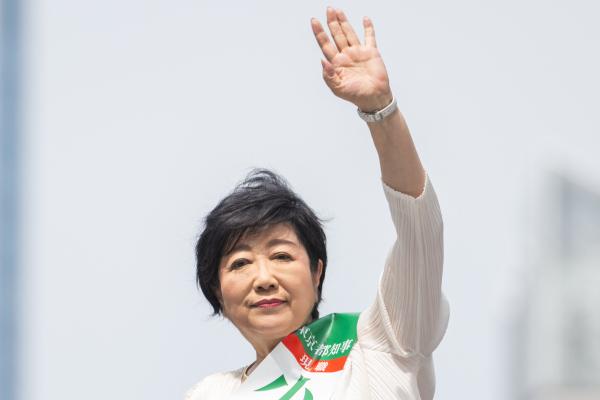
Governor Koike will sit down for a fireside chat with Japan Chair Kenneth R. Weinstein.


Hudson Institute’s China Center will convene experts and policymakers to discuss the potential collapse of CCP authority in China.

